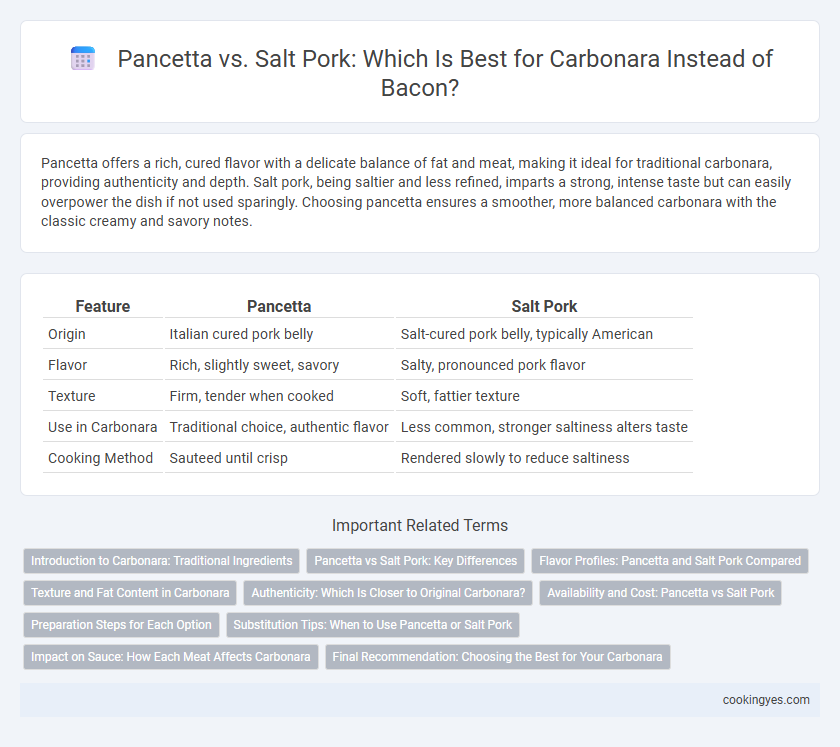Pancetta offers a rich, cured flavor with a delicate balance of fat and meat, making it ideal for traditional carbonara, providing authenticity and depth. Salt pork, being saltier and less refined, imparts a strong, intense taste but can easily overpower the dish if not used sparingly. Choosing pancetta ensures a smoother, more balanced carbonara with the classic creamy and savory notes.
Table of Comparison
| Feature | Pancetta | Salt Pork |
|---|---|---|
| Origin | Italian cured pork belly | Salt-cured pork belly, typically American |
| Flavor | Rich, slightly sweet, savory | Salty, pronounced pork flavor |
| Texture | Firm, tender when cooked | Soft, fattier texture |
| Use in Carbonara | Traditional choice, authentic flavor | Less common, stronger saltiness alters taste |
| Cooking Method | Sauteed until crisp | Rendered slowly to reduce saltiness |
Introduction to Carbonara: Traditional Ingredients
Traditional Carbonara relies on guanciale, a cured pork cheek, but pancetta and salt pork often serve as substitutes, each contributing distinct textures and flavors. Pancetta, an Italian cured pork belly, offers a rich, slightly spiced taste that closely mimics guanciale's authenticity, enhancing the creamy sauce without overpowering it. Salt pork, saltier and fattier, can alter the balance, making pancetta the preferred choice for preserving Carbonara's classic flavor profile.
Pancetta vs Salt Pork: Key Differences
Pancetta and salt pork are both cured pork products commonly used in Italian cooking, but pancetta is specifically pork belly cured with salt and spices, offering a balanced, savory flavor ideal for carbonara. Salt pork is salt-cured pork belly or fatback, typically saltier and less spicy than pancetta, which can affect the seasoning balance in carbonara dishes. Pancetta's smooth texture and subtle seasoning make it the preferred choice to achieve authentic creamy carbonara, while salt pork may require adjustment in salt levels due to its intense saltiness.
Flavor Profiles: Pancetta and Salt Pork Compared
Pancetta offers a rich, delicate pork flavor with a subtle sweetness and aromatic spices that enhance carbonara's creamy sauce. Salt pork delivers a more robust, salty punch with a fattier texture, intensifying the dish's savoriness but risking overwhelming the balance. Choosing pancetta preserves traditional Italian flavor nuances, while salt pork creates a heartier, bolder taste profile for carbonara.
Texture and Fat Content in Carbonara
Pancetta offers a tender texture and balanced fat content that renders smoothly, creating a creamy mouthfeel essential for authentic carbonara. Salt pork typically has a firmer, chewier texture and higher fat concentration, which can lead to a greasier sauce and overshadow the dish's delicate flavors. Selecting pancetta ensures a harmonious blend of richness and softness, enhancing the traditional carbonara's creamy consistency without excess oiliness.
Authenticity: Which Is Closer to Original Carbonara?
Pancetta is closer to the original carbonara, as traditional Roman recipes use this Italian cured pork belly for its balanced fat content and rich, savory flavor. Salt pork, while similar in fattiness, lacks the nuanced seasoning and curing process that defines authentic carbonara. The use of pancetta preserves the dish's signature creamy texture and smoky undertones without overpowering the delicate egg and cheese emulsion.
Availability and Cost: Pancetta vs Salt Pork
Pancetta is widely available in specialty stores and higher-end supermarkets, often commanding a higher price due to its artisanal curing process and Italian origin. Salt pork, commonly found in traditional grocery stores and bulk food suppliers, tends to be more affordable and accessible, making it a budget-friendly alternative for carbonara. Choosing between pancetta and salt pork depends on balancing the authentic flavor and texture with availability and cost considerations.
Preparation Steps for Each Option
Pancetta for carbonara is prepared by curing pork belly with salt, sugar, and spices, then air-dried for several weeks to develop a rich, savory flavor and firm texture. Salt pork undergoes heavy salting and sometimes smoking, with minimal aging, resulting in a saltier and softer product that requires soaking or blanching to reduce excess salt before cooking. Using pancetta offers a more balanced, tender bite ideal for carbonara, while salt pork demands careful preparation to avoid overpowering the dish with saltiness.
Substitution Tips: When to Use Pancetta or Salt Pork
Pancetta offers a delicate, slightly sweet flavor and tender texture ideal for authentic carbonara, while salt pork provides a richer, saltier taste with a firmer bite, making it a suitable substitute when pancetta is unavailable. Use pancetta for a traditional Italian flavor profile, especially in recipes prioritizing subtle pork aroma and smooth fat render. Opt for salt pork when seeking a more pronounced briny punch and increased fat content that enhances the creaminess of the sauce without overpowering other ingredients.
Impact on Sauce: How Each Meat Affects Carbonara
Pancetta imparts a rich, savory depth and slight sweetness that enhances carbonara's creamy sauce with a balanced fat release, creating a silky texture. Salt pork contributes a saltier, more intense pork flavor but can dominate the sauce if used excessively, potentially overpowering the delicate egg and cheese blend. Choosing pancetta results in a smoother, more harmonious sauce consistency, while salt pork offers a bolder, salt-forward profile that alters the traditional creaminess of carbonara.
Final Recommendation: Choosing the Best for Your Carbonara
Pancetta offers a rich, savory flavor with a perfect balance of fat and meat that enhances the creamy texture of authentic carbonara, while salt pork provides a saltier and fattier profile that can overpower the dish. For an ideal carbonara, pancetta is recommended due to its subtle seasoning and ability to render crispy, flavorful fat without overwhelming the delicate egg and cheese sauce. Selecting pancetta ensures a traditional taste experience that aligns with classic Italian carbonara recipes.
Pancetta vs salt pork for carbonara Infographic

 cookingyes.com
cookingyes.com